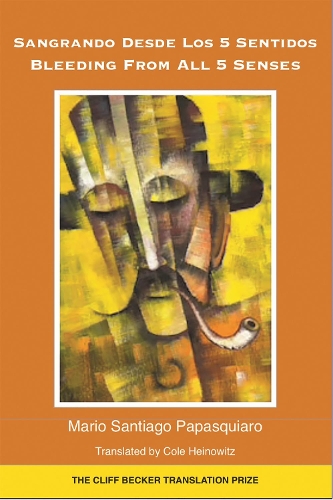
Bleeding from all 5 Senses
(Paperback)
Publishing Details
Bleeding from all 5 Senses
By (Author) Mario Santiago Papasquiaro
Translated by Cole Heinowitz
White Pine Press
White Pine Press
28th April 2020
United States
Classifications
Physical Properties
Paperback
150
Width 152mm, Height 228mm
Description
Most readers have never heard of Jos Alfredo Zendejas Pineda (1953-1998). A few might know him by his pseudonym, Mario Santiago Papasquiaro. But many readers know (and even love) the quasi-mythical character he inspired, Ulises Lima, from Roberto Bolaos The Savage Detectives: a ticking time bomb who wrote incessantly in the margins of books that he stole and on pieces of scrap paper that he was always losing, but who never wrote poems. The real Santiago did, in fact, fill every page he could find with his words. And he may indeed have been a ticking time bomb. Butfor the recordhe did write poems.
Reviews
The raucous energy and desperate inventiveness of Bleeding From All 5 Senses takes on a second life in Heinowitzs sinuous translations of Papasquiaro. Melding persistent social and emotional urgency, Bleeding from All 5 Senses affectively embodies something vital of our tumultuous world.
In a compendium of tones ranging from the slyly humorous to the jarringly serious, Heinowitz renders Papasquiaros poems with meticulous care and creativity. Heinowitz conveys the intensity and music of Papasquiaros voice in English in such a way that the poets language takes on new valences of meaning in both Unitedstatesian and international anglophone contexts. Heinowitzs translation of Papasquiaros roving tonal shifts, idiosyncratic syntax, and mosaic of sociocultural concerns makes a new and useful contribution to contemporary anglophone poetry.
Cliff Becker Prize Judges Daniel Borzutzky, Aaron Coleman, and Mani Rao
Mario Santiago Papasquiaro ignited a blaze that continues to burn. In his manuscripts, asterisks fall like sparks announcing flames. Each of his texts is the scene of intense daring: the poet enters the ring to deal his own shadow a knockout blow. Rarely has literature been put to the test with such courage. Mario despises feints; he does not try to bedazzle but he does play with fire. Convinced that true victory is in the flesh, he shows us the scars with which he writes the body.Juan Villoro
"I think the illuminating side of his work as a poet is still revealing itself. One merit of his poetry (and one that people may not be aware of) was that which distinguished him from the writers he admiredfor example, his ability to portray a particular dimension of the coarseness of urban life (more prominent now than ever) that still hadnt been expressed in Mexican poetry, despite the achievements of Efran Huerta, the innovations of Salvador Novo and Renato Leduc, and the creative maneuverings of the Stridentists. Mario Santiago took his role as Mexico Citys flneur very seriously, and a significant portion of his poetic visions are derived from real experiences. He managed to validate his own field of vision and to offer forth, from that vantage point, the sum of his impressions."Claudia Kerik
Author Bio
Mario Santiago Papasquiaro (1953-1998) is the pseudonym of Jos Alfredo Zendejas Pineda, the poet immortalized as Ulises Lima in Roberto Bolaos novel The Savage Detectives. Born in Mexico City, Santiago came of age during a period of acute political repression, artistic censorship, and violations of academic autonomy that culminated in the 1968 Tlatelolco Massacre, in which hundreds of student protesters and bystanders were killed or injured, and over a thousand were arrested. Over the years, Santiagos poems trickled out in small infrarealist magazines and anthologies. In the mid-nineties, he released the only two books to be published during his lifetime, Beso eterno [Eternal Kiss] (1995) and Aullido de cisne [Swans Howl] (1996), both under his own imprint, Al Este del paraso [East of Eden]. At the time of his death in 1998, he left behind over 1,500 poems.
Cole Heinowitz is a poet, translator, and scholar of British, Latin American, U.S., and transatlantic literature from the nineteenth century to the present. She is the author of two books of poetry, The Rubicon (The Rest, 2008) and Daily Chimera (Incommunicado Press, 1995), and the chapbook Stunning in Muscle Hospital (Detour Press, 2002). Heinowitz is the translator of Mario Santiago Papasquiaros Advice from 1 Disciple of Marx to 1 Heidegger Fanatic (Wave Books, 2013) and Beauty is Our Spiritual Guernica (Commune Editions, 2015), as well as A Tradition of Rupture: Selected Critical Writings of Alejandra Pizarnik. She is Associate Professor of Literature at Bard College, where she has taught since 2004.
